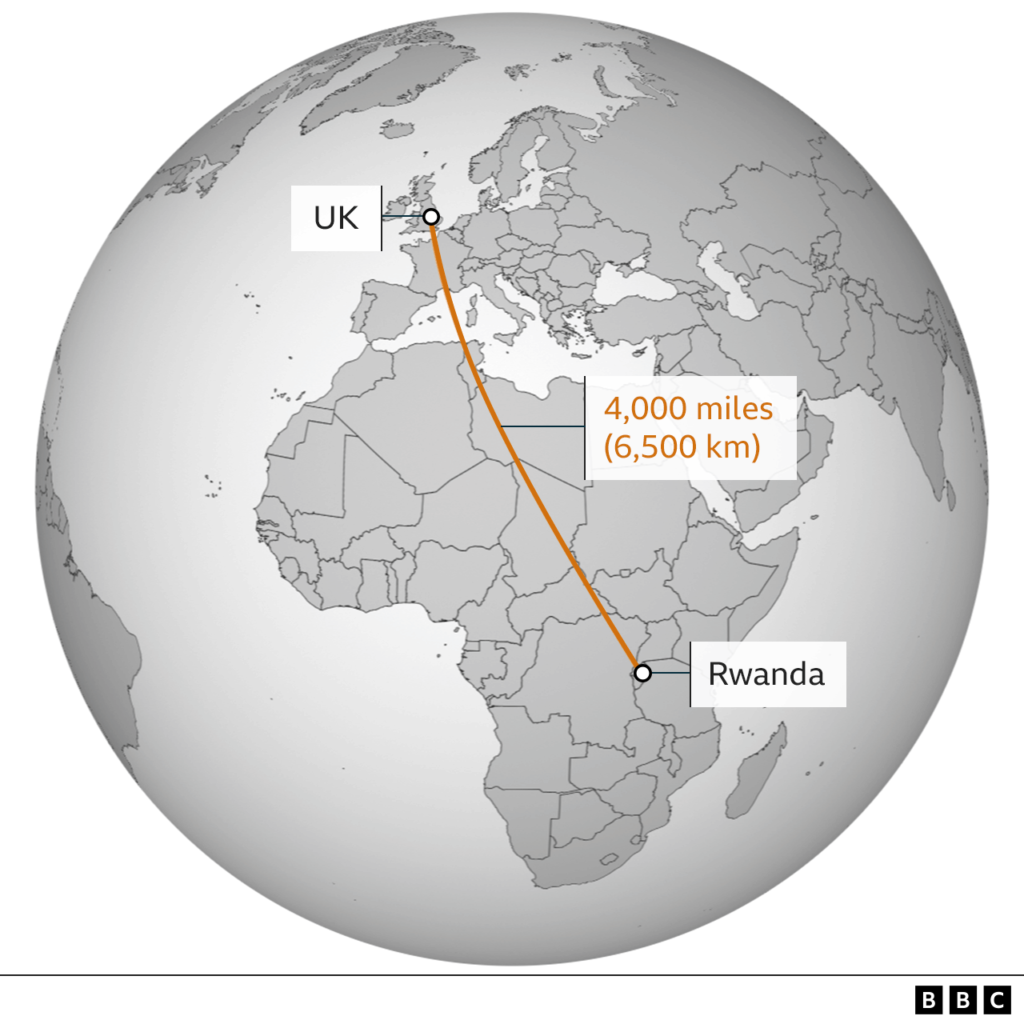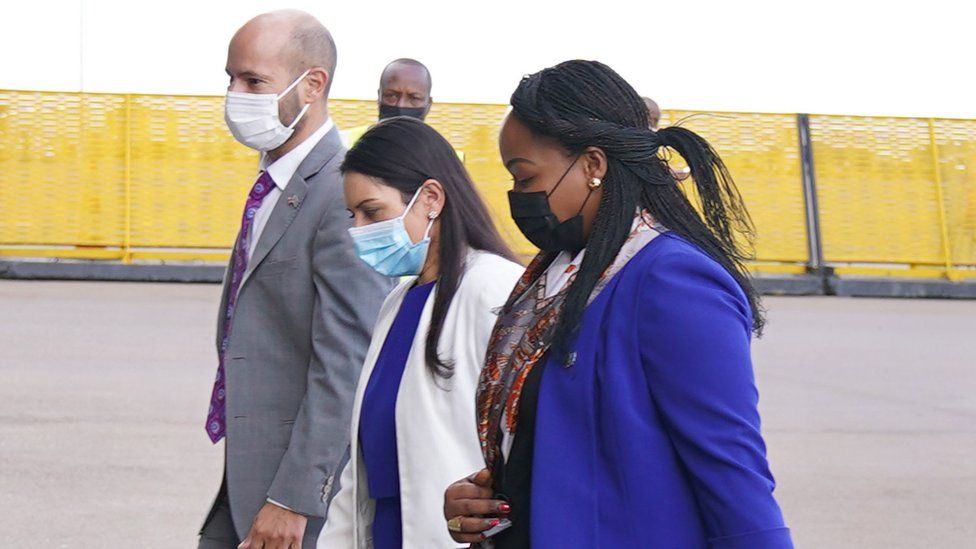Some asylum seekers who arrive in the UK on small boats across the Channel will be given a one-way ticket to Rwanda, under new government plans.
Home Secretary Priti Patel is in the African nation to agree a £120m trial involving mostly single men arriving in Britain on boats or lorries.
BBC home editor Mark Easton, reporting from Rwanda, said ministers face legal hurdles and substantial costs.
Refugee organisations have criticised the plans as cruel and urged a rethink.
Labour said the plan was "unworkable, unethical and extortionate" - the Lib Dems said it would be expensive and ineffective.
Precise details of the plan are yet to be confirmed, but, Mark Easton said the trial would be restricted to mostly single men the British authorities believe are inadmissible.
Under the proposal, Rwanda would take responsibility for the people who make the more than 4,000 mile journey, put them through an asylum process, and at the end of that process, if they are successful, they will have long-term accommodation in Rwanda.
The BBC has seen accommodation the asylum seekers will be housed in, thought to have enough space for around 100 people at a time and to process up to 500 a year. Nearly 29,000 migrants crossed the Channel in 2021.
The Rwandan government said migrants will be "entitled to full protection under Rwandan law, equal access to employment, and enrolment in healthcare and social care services".
The UK Home Office believes existing asylum law will be enough to implement the plan, but questions remain about the legality of the scheme.
Opponents have also said the annual cost of the full scheme would be far higher than the initial £120m payment and raised concerns about Rwanda's human rights record.
Wales Secretary Simon Hart said the plan was about ensuring the government can "more fairly distinguish between asylum seekers, refugees and economic migrants".
Around three quarters of people who apply for asylum in the UK are granted the status.
Mr Hart said the full detail of the scheme will be released later on Thursday, but added the underlying motivation for the plan was breaking the business model of criminal gangs who put people in small boats to cross the Channel.
In a speech in Kent, Mr Johnson argued action is needed to stop "vile people smugglers" turning the ocean into a "watery graveyard".
Last year, 28,526 people are known to have crossed in small boats, up from 8,404 in 2020.
Around 600 people made the crossing on Wednesday, and Mr Johnson said the figure could reach 1,000 a day within weeks.
"We cannot sustain a parallel illegal system," he said. "Our compassion may be infinite, but our capacity to help people is not."

Questions have also been raised over the human rights record of the Rwandan government and its president, Paul Kagame.
A number of his critics have been killed, or been subject to assassination attempts, but Rwanda has always dismissed suggestions its government was involved.
Concerns have also been raised over the conviction of Paul Rusesabagina - the subject of Hollywood film Hotel Rwanda about his role saving more than 1,000 people during Rwanda's 1994 genocide - on terrorism charges.
Last year, the UK government itself expressed concern over "continued restrictions to civil and political rights and media freedom" in Rwanda at the United Nations, calling for independent investigations into "allegations of extrajudicial killings, deaths in custody, enforced disappearances and torture".

The prime minister also announced plans to hand operational control of the Channel to the navy, break the business model of people-smuggling gangs, and deter people from risking the crossing.
The measures are part of the government's long-term plan to "take back control of illegal immigration" after Brexit, Mr Johnson said.
While the number of people crossing the Channel in boats has increased, last year saw fewer people using other routes - such as by lorry - in part because of increased security at the Port of Calais.

A hugely controversial plan

The partnership with Rwanda is the centrepiece of a wider policy blitz to deal with what has been a humiliation for ministers who promised Brexit would mean control of Britain's borders.
Instead, record numbers of asylum seekers have been turning up in dinghies beneath the white cliffs of Dover. This year has already seen 4,578 arrivals and looks set to be a new record.
Sending asylum seekers to Rwanda, however, is likely to prove hugely controversial and legally fraught.
Critics point to Rwanda's poor human rights record. At the UN last year, the UK demanded investigations into alleged killings, disappearances and torture.
Ministers will have to explain why Rwanda is the right place to entrust with protecting the human rights of vulnerable asylum seekers who hoped the UK would protect them.

Powers awaiting approval
The government's Nationality and Borders Bill includes a provision to create offshore immigration processing centres for asylum seekers.
The bill is making its way through Parliament, but with the parliamentary session expected to end within weeks, time is running out to pass it into law.
MPs are currently on a break, but when they return, they are due to review a series of amendments, including one about powers to offshore asylum claims.
The government has suffered a series of defeats in the House of Lords over the bill, which has come in for criticism and sparked protests.
Labour and the SNP have opposed offshoring asylum claims, and the UN's high commissioner for refugees said the practice "would be a breach of the UK's international obligations".
The plan to process asylum seekers abroad was first reported by the Times newspaper last year.
The newspaper said the Home Office had discussed the proposals with their counterparts in Denmark, which has passed legislation allowing it to relocate asylum seekers to countries outside Europe.
Criticism
Human rights campaigners have highlighted the negative impact on refugee human rights, the cost of the scheme, and have questioned whether it will achieve its aims.
Enver Solomon, chief executive of the Refugee Council, said the proposal would not address the reasons why desperate people travel to the UK.
Amnesty International UK described the plan as "shockingly ill-conceived idea" which would inflict further suffering and waste "huge amounts" of public money.
Shadow culture secretary Lucy Powell said "we all want to see an end to the illegal crossings", but that Labour advocates "boring measures" like curbs on people smugglers.
Alistair Carmichael, home affairs spokesperson for the Liberal Democrats, said: "Thousands of families are opening their homes to refugees, but this Conservative government is slamming the door in their face."
The SNP Westminster leader, Ian Blackford, described the idea of sending "vulnerable people" to Rwanda as "absolutely chilling".
Latest Stories
-
Champions of 2024 Inter-School Reading Quiz tour Mohammed Bin Rashid Library in Dubai
2 hours -
Mahama decouples Youth from Sports Ministry
2 hours -
President Mahama orders immediate suspension of state land transactions
2 hours -
Edward Bawa: NDC left $2.4bn energy debt, NPP aggravated the situation
2 hours -
Joint military police reinforcement deployed in Ejura
2 hours -
Fire guts 3 shops in Ho
2 hours -
Gunmen attack bus in Bolgatanga, leaving several injured
2 hours -
NDC supporters allegedly invade Bui Power Authority, call for staff removal
2 hours -
‘Cutting ministries is about sentiment, not savings’ – Bright Simmons analyses Mahama’s new Cabinet
2 hours -
Walker wants to ‘explore’ Man City exit – Guardiola
12 hours -
Ejura Sekyeredumase MP demands autopsy on resident who died in Police custody
13 hours -
Kusaas Diaspora Union launched to spearhead global unity, development
15 hours -
Bright Simmons: Mahama’s reduction of ministries to 23 amid calls for efficiency, cost-cutting
15 hours -
Maxwell Hanson seeks apology and compensation from Anim Addo over defamation claims
16 hours -
We listen, we don’t judge: What they don’t tell you about being an entrepreneur
16 hours

